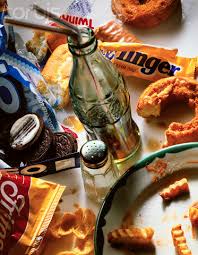Binge-eating is something I feel I <sometimes> struggle with. It's not an all the time thing, but on occasion I have this urge to just eat and eat for no reason. Binge-eating is stated as a serious eating disorder in which you frequently consume unusually large amounts of food. Everyone can admit to overeating at times, however, overeating for some crosses the line to binge-eating disorder and it becomes a regular occurrence, shrouded in secrecy.
There is a compulsion to eat and eat which is similar to someone that has a drinking problem. There is something going on in the brain that doesn't give that "enough" sensation to tell you to stop. There is a certain euphoria you feel. But who wants to admit they are a binge eater? This is something that is embarrassing and is very costly. It feels good to eat, but there is a line and once that line is crossed its hard to stop. I love to eat, who doesn't but when this happens I always feel like shit during and afterwards ....mentally, emotionally and physically.
 Biological factors. People with binge-eating disorder may have inherited genes that made them more susceptible to developing an eating disorder. In addition, brain chemicals may be altered in people with binge-eating disorder.
Psychological factors. Psychological and emotional factors may also play a role in binge-eating disorder. You may have low self-worth and trouble controlling impulsive behaviors, managing moods or expressing anger.
Environmental factors. Modern Western culture often cultivates and reinforces a desire for thinness. Although most people who have binge-eating disorder are overweight, they are probably acutely aware of their appearance and may get angry with themselves after eating binges.
Biological factors. People with binge-eating disorder may have inherited genes that made them more susceptible to developing an eating disorder. In addition, brain chemicals may be altered in people with binge-eating disorder.
Psychological factors. Psychological and emotional factors may also play a role in binge-eating disorder. You may have low self-worth and trouble controlling impulsive behaviors, managing moods or expressing anger.
Environmental factors. Modern Western culture often cultivates and reinforces a desire for thinness. Although most people who have binge-eating disorder are overweight, they are probably acutely aware of their appearance and may get angry with themselves after eating binges.


Symptoms of binge-eating:
*Eating large amounts of food
*Eating even when you're full
*Eating rapidly during binge episodes
*Feeling that your eating behavior is out of control
*Eating a lot even though you're not hungry
*Depression
*Anxiety
*Frequent dieting, possibly without weight loss
*Frequently eating alone
*Feeling depressed, disgusted or upset about your eating
<source: Mayo Clinic website>




